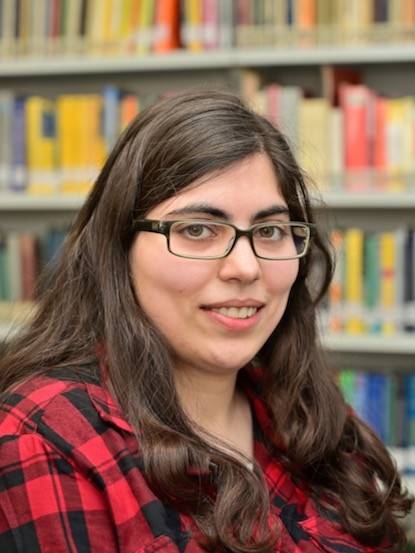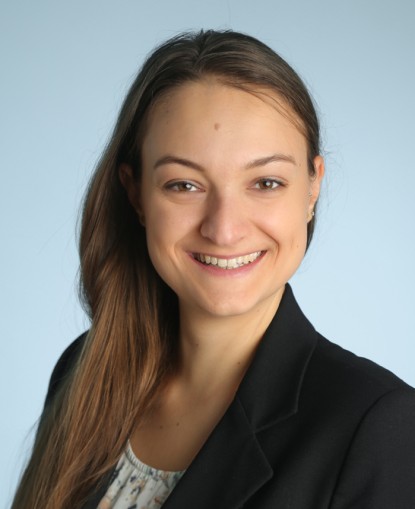12.10.2022
In the Bavarian town of Miltenberg, the German national committee of the Union Radio-Scientifique Internationale (U.R.S.I.) once again invited participants to the Kleinheubach Tagung at the end of September. This annual event gives scientists from various disciplines in electrical engineering and information technology the opportunity to present their research work and exchange insights. Special emphasis is also placed on the promotion of young scientists: Each year, several “Young Scientist Awards” as well as the first, second and third place of the “Young Scientist Best Paper Award” are presented to young scientists.
Laura DˈAngelo is a research associate in the research group “Quasistatics in Computational Engineering” of Athene Young Investigator Dr.-Ing. Yvonne Späck-Leigsnering at the Institute for Accelerator Science and Electromagnetic Fields (TEMF) with Prof. Dr.-Ing. Herbert De Gersem (Department of Electromagnetic Field Theory) and received both the “Young Scientist Award” and the first place “Young Scientist Best Paper Award” at the Kleinheubacher Tagung of the U.R.S.I..
Anna Ziegler, also a research associate at TEMF and in the research group of Prof. Dr. rer. nat. Sebastian Schöps (Department of Computational Electromagnetics), was awarded the “Young Scientist Award”.
More efficient simulations through sophisticated symmetry exploitation
Laura DˈAngelo's work “Quasi-3D Magneto-Thermal Quench Simulation of Superconducting Coil Magnets” deals with the computer simulation of the so-called quench phenomenon in superconducting accelerator magnets. If not detected in time, such a quench can seriously damage the valuable accelerator magnets and, in the worst case, lead to the long-term shutdown of the accelerator facility. Simulations play a crucial role in understanding the quench phenomenon, but the multi-scale geometry of accelerator magnets imposes significant challenges for simulation engineers.
The awardee exploited certain symmetries in the accelerator magnet to develop and implement a sophisticated numerical method that succeeds in simulating the quench phenomenon in long accelerator magnets much more efficiently than conventional simulation methods. To this end, she combined two different conventional discretization methods to create a new, so-called “quasi-3D method.” In her work, she used the method to multiphysically simulate quench propagation in a superconducting magnet coil.
Laura DˈAngelo's work is supported by the German Federal Ministry of Education and Research (BMBF-05P18RDRB1), the Graduate School of Computational Engineering at TU Darmstadt and the AccelencE Research Training Group (DFG Research Group 2128 “Accelerator Science and Technology for Energy Recovery Linacs”) at JGU Mainz.
More efficient uncertainty quantification through smart geometry data exploitation
Anna Ziegler's work “Uncertainty Quantification of the TESLA cavity using High-Order Shape Derivatives” investigates the effects of manufacturing inaccuracies in resonators used in particle accelerators.
Since inaccuracies in the resonator geometry strongly influence the electric field, one would like to establish a relationship between the geometry inaccuracies and the acceleration frequency. One way to describe the uncertainty would be to simulate many samples. However, since the fields in the resonator can only be determined numerically, this results in a high computational cost for each evaluation. In her work, the awardee reduces this effort by using derivatives based on the geometry deformation. She formulates these derivatives based on the representation of the geometry in a CAD system and can thus reduce the effort required to quantify the inaccuracies in the acceleration frequency.
Anna Ziegler's work is supported by the Graduate School of Computational Engineering at TU Darmstadt and by the Federal Ministry of Education and Research (BMBF) and the state of Hesse as part of the NHR Program.
The Awardees
| Name | Working area(s) | Contact | |
|---|---|---|---|

| Dr.-Ing. Laura D‘Angelo | Computational Magnet Analysis and Dynamics | dangelo@temf.tu-... +49 6151 16-24029 S2|17 142 |

| Anna Ziegler M.Sc. | Efficient Methods for Parameterized Eigenvalue Problems in Electromagnetism | anna.ziegler@tu-... +49 6151 16-24380 S2|17 39 |

